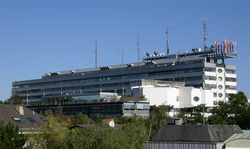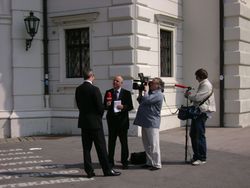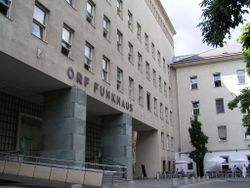Österreichischer Rundfunk
 |
|
| Type | television network |
|---|---|
| Country | |
| Availability | Austria, partly Switzerland, partly Germany, Bolzano-Bozen (Italy) |
| Slogan | Am liebsten ORF |
| Key people | Alexander Wrabetz |
| Launch date | August 1, 1955 |
| Former names | Österreichisches Rundspruchwesen |
| Official Website | www.orf.at |
ORF (Österreichischer Rundfunk, "Austrian Broadcasting") is the Austrian national public service broadcaster. Funded from a combination of a television licence fees and revenue from limited on-air advertising, ORF is the dominant player in the Austrian broadcast media.[1] Austria was the last country in Europe after Albania to allow national private television.
Contents |
History of broadcasting in Austria


The first test transmissions in Austria were made in 1923 by Radio Hekaphon, run by a technical school in Vienna. It was, however, the publicly owned RAVAG – Radio-Verkehrs-Aktiengesellschaft, "Radio Communication Company Ltd" – which, in February 1924, was awarded the concession to begin broadcasting, with the radio pioneer and enthusiast Oskar Czeja as its Director-General. Regular transmissions began on 1 October 1924 from studios inside the Ministry of Armed Forces building that were to become known as "Radio Wien". By the end of October 1924 the station already had 30,000 listeners, and by January 1925 100,000. Relay transmitters, established across the country by 1934, ensured that all Austrians could listen to Radio Wien.
With the Anschluss in 1938, RAVAG was eliminated and Radio Wien was made subordinate to the Reichsrundfunk in Berlin. Following Germany's defeat in 1945, independent Austrian radio broadcasting was re-established, and a new "Radio Wien" was founded, once again under Oskar Czeijas. A number of other radio stations began broadcasting in the different occupation zones and radio become a popular medium among Austrians: in 1952 there were 1.5 million radio sets in Austrian homes. In 1955 the various regional stations were brought together as the Österreichisches Rundspruchwesen ("Austrian Broadcasting Entity") which later, in 1958, became the Österreichischer Rundfunk GmbH, forerunner of today's ORF.
Radio channels

- Ö1 - ORF's cultural and principal news channel
- Hitradio Ö3 - pop music channel
- FM4 - channel for (alternative) youth culture
- The former Ö2 has been replaced by nine regional channels (one for each Bundesland):
- Radio Burgenland
- Radio Kärnten
- Radio Niederösterreich
- Radio Oberösterreich
- Radio Salzburg
- Radio Steiermark
- Radio Tirol
- Radio Vorarlberg
- Radio Wien
All of these radio channels are broadcast terrestrially on FM and via the digital service of the Astra satellites at 19.2° east.
An additional service, Radio 1476, is broadcast on medium-wave in the evenings between 18.00 and just after midnight. Its schedule is a mixture of items from Ö1, programmes for linguistic and cultural minorities, folk music, and special productions.
All of ORF's domestic radio channels are also streamed over the internet. An extra 24-hour all-news channel is available exclusively via internet: this is Ö1-Inforadio which relays all of Ö1's news content and fills the "gaps", during which Ö1 is transmitting music and cultural programmes, with additional news broadcasts.
A version of Ö1 is broadcast internationally via short wave (and satellite in Europe} as Radio Österreich 1 International. Its schedule includes a small number of programmes in English and Spanish.
Television channels
- ORF1
- ORF1 HD
- ORF2 (with regional programmes)
- ORF2 Europe
- ORF Sport Plus
- 3sat (in association with ARD, ZDF and SF)
- TW1 (sharing frequency with ORF Sport Plus, not available on terrestrial television)
The ORF television channels are broadcast terrestrially and via the Astra 1H satellite at 19.2° east. Via satellite ORF1 and ORF2 are encrypted allowing only Austrian residents who pay the Austrian television licence (Gebühren Info Service, "GIS") to watch them. TW1, ORF Sport Plus and ORF2 Europe are unencrypted and receivable via satellite in Europe.
ORF is a supporter of the Hybrid Broadcast Broadband TV (HbbTV) innitiative (a consortium of broadcasting and Internet industry companies including SES Astra, OpenTV and Institut für Rundfunktechnik) that is promoting and establishing an open European standard for hybrid set-top boxes for the reception of broadcast TV and broadband multimedia applications with a single user interface.
Regional studios
The ORF has one regional studio in each state, where each state produces its own radio and state television, which is broadcast over ORF2. The regional studio in Tyrol, also produces regional television and radio for the German-speaking population of Bolzano-Bozen, Italy. Even though each state has its own studio, most ORF productions are heavily focused on Vienna, since most shows are made there.
External links
- Official site
- Ö1 International Information about international broadcasts of Ö1 with additional programs.
- Austrian transmitting sites
- Austrian DVB-T multiplexes
|
|||||||||||||||||
|
|||||||||||||||||||||||||||